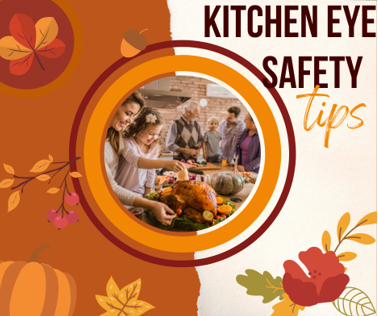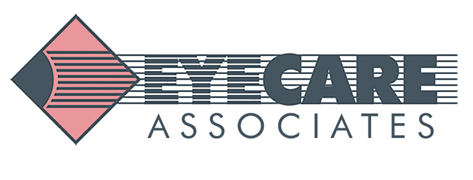Kitchen Eye Safety Tips
Posted by: Eyecare Associates of New Orleans in Uncategorized on November 17, 2021

We are fast approaching the biggest holiday seasons to celebrate, spend time with family, and spend most of our time in the kitchen preparing our favorite holiday dishes. As we prepare our delicious meals, we want to remind you to practice kitchen safety to protect you and your loved ones from a preventable eye injury.
Don’t Slip! Keep Floors Clean and Cabinet Doors Closed
Loose rugs, open cabinets, and liquid spills on the floor could be more of a hazard to your eyes than you realize. Falls are a top cause of eye injury in the United States. People 60 years old and older are especially prone to eye injuries from falls. Before cooking, make sure your kitchen is as safe for grandma as it is for the grandkids.
Handle Sharp Objects With Care
We can sometimes find ourselves rushing to get things done during the holidays, letting safety precautions we would typically follow we forget to put into use. This includes being careful with sharp tools in the kitchen. Sharp objects are the third most common cause of eye injury, including knives, forks, scissors, and skewers. It is critical always to handle these sharp objects carefully and put them away safely when you are done using them.
Look Out For Bubbling Sauces and Splashing Liquids
Any liquid that splashes in your eye can be uncomfortable. However, food liquids may be hazardous. Sauces from food are often acidic and can cause your eyes to tear up and sting. Some foods, like raw chicken liquid, contain bacteria that could cause an eye infection. Simmering sauces can splash out of the pot and burn or blister your eye.If this happens, flush your eye with plenty of water and seek medical treatment right away.
Any liquid that splashes in your eye can be uncomfortable. However, food liquids may be hazardous. Sauces from food are often acidic and can cause your eyes to tear up and sting. Some foods, like raw chicken liquid, contain bacteria that could cause an eye infection. Simmering sauces can splash out of the pot and burn or blister your eye.If this happens, flush your eye with plenty of water and seek medical treatment right away.
When you chop peppers such as jalapeño and use other spicy ingredients, your fingers retain oily residues that can end up in your eyes. Wash your hands thoroughly after preparing food, or better yet, wear gloves while chopping vegetables and working with spices. If pepper or spice oils end up in your eye, flush with plenty of water and then wash your eyelids and the area around your eye with baby shampoo. Never put any soap directly in your eye.
Avoid Risk Of Eye Injuries From Steam
Steam can cause severe eye injuries such as blurry vision, redness, irritation, and inflammation. There is a higher risk of getting your eyes injured from steam while preparing dishes such as rice or vegetables. To ensure eye safety, keep a distance while letting out the steam of the cooking pot. Having a pair of safety glasses while cooking these dishes will be a great kitchen safety tool to have on hand.
Don’t Forget To Wash Your Hands Frequently
When you are busy cooking, it is easy to accidentally transfer ingredients from your hands to your eyes. Fortunately, this could be easily prevented by remembering to wash your hands with hot, soapy water after preparing foods. It is essential to wash your hands after handling raw poultry, and spicy ingredients since these can cause infection, burning, and irritation.
If you or a loved one sustain an eye injury, seek medical attention immediately. Please contact your eye doctor or go to an emergency room as soon as possible.
We are committed to providing the highest quality eye care, and our experienced team is available to diagnose and treat all types of eye conditions.
We wish you and your family a happy, safe, and healthy holiday season!

References:
American Academy of Ophthalmology
The content is researched and vetted by the American Academy of Ophthalmology and the American Optometric Association. This blog provides information and discussion about eye health and related subjects. The content provided on this blog and any linked materials are not intended and should not be considered medical advice. If the reader or any other person has a medical concern, they should consult with an appropriately licensed physician.

 Online Bill Pay
Online Bill Pay